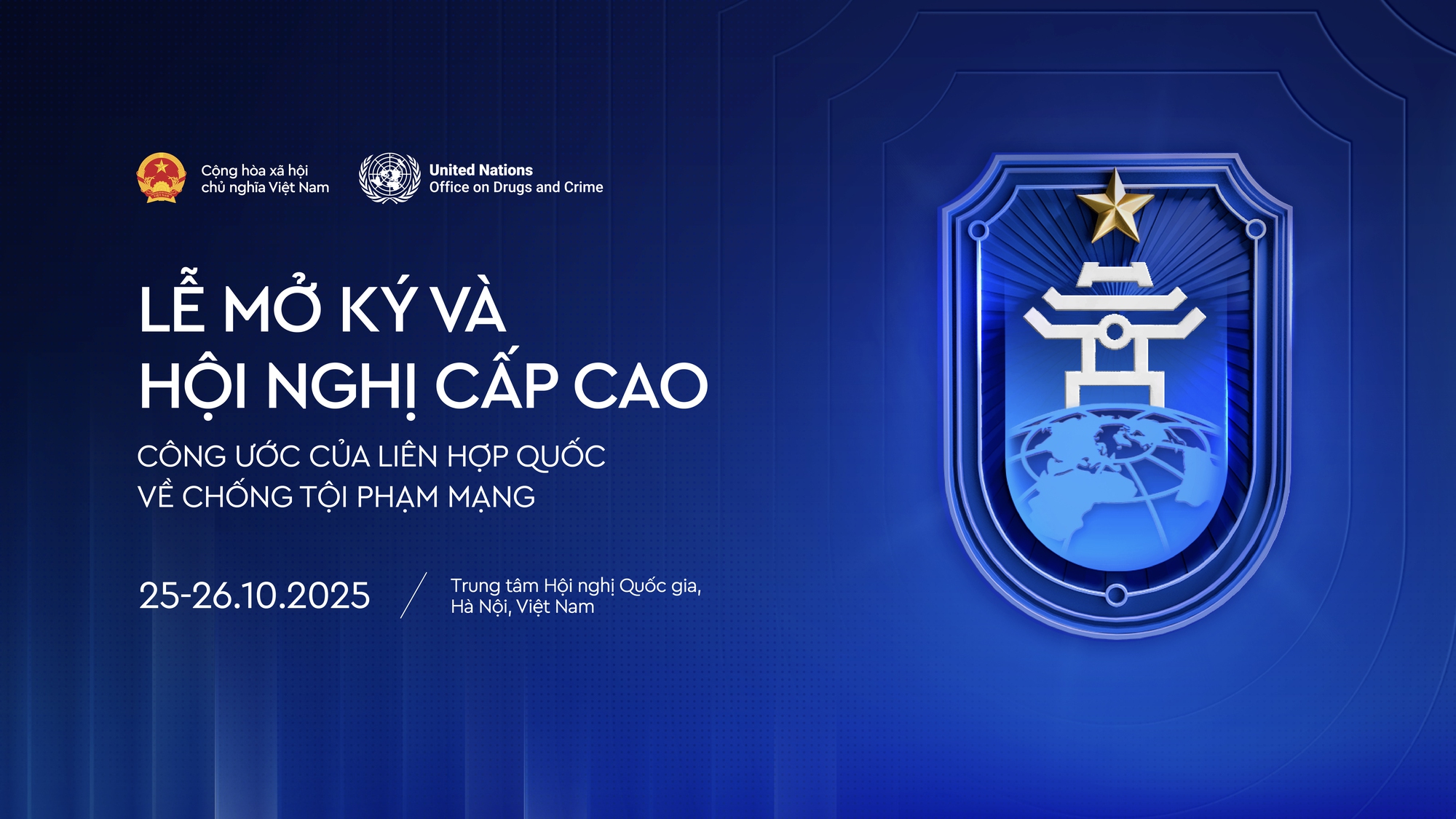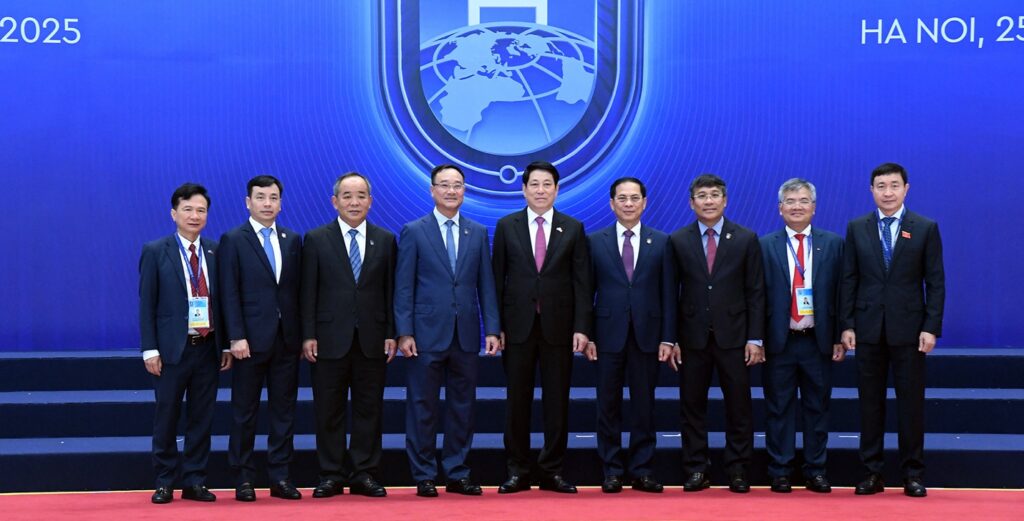
THE HANOI CONVENTION: A DECLARATION OF GLOBAL COOPERATION IN DIGITAL ERA
NhanDan – On October 26, in Hanoi, Vietnam, within the framework of the Signing Ceremony of the United Nations Convention against Cybercrime, a high-level session on international cooperation in combating cybercrime took place under the co-chairmanship of Deputy Minister of Public Security Pham The Tung and Standing Deputy Minister of Foreign Affairs Nguyen Minh Vu.
Previously, on October 25, the United Nations (UN) Convention against Cybercrime – also known as the “Hanoi Convention” – was officially opened for signing in Hanoi. This is considered a historic milestone in international cooperation to build a global legal order in cyberspace. The signing ceremony with the theme “Combating Cybercrime – Sharing Responsibility – Looking Towards the Future” was attended by UN Secretary-General Antonio Guterres, along with leaders and senior representatives of about 110 countries and many international organizations..
The Hanoi Convention is not merely a legal document but stands as a “declaration of global cooperation in the digital era.”

Triumph of Multilateralism in the Digital Era
Speakers at the session praised the Convention as a triumph of multilateralism and international law. In today’s global context, information and communication technologies, while serving as drivers of development, are also being exploited as “weapons” for criminal activities that may even threaten national sovereignty. Hence, the Convention is regarded as a vital international instrument.
The adoption of the Convention demonstrates global consensus and the effectiveness of the multilateral system, marking the beginning of a new chapter in global digital governance. It represents the first global legal framework designed to address cross-border threats in cyberspace. The representative of the Republic of Nicaragua expressed appreciation to Vietnam, commending the host country’s strong commitment to multilateralism and affirming that the Convention reflects a firm political will to strengthen international cooperation.

Three Core Values of the Convention
Speakers highlighted three core values that the Hanoi Convention brings to the global fight against increasingly complex and widespread cybercrime:
- Promoting Cooperation in Preventing and Combating Cybercrime:
The Convention serves as a global legal framework fostering collaboration through transparent information sharing, investigation, and prosecution. This is particularly crucial in addressing crimes such as online fraud and child sexual exploitation. - Protecting Human Rights:
The Convention provides essential tools to safeguard human rights in the digital environment. - Enhancing Capacity Building and Technical Assistance:
It establishes a legal foundation for technical support and capacity-building programs, especially for developing countries, in combating cybercrime and protecting vulnerable groups. The representative of Luxembourg called on the international community to support less developed nations that lack the resources to prevent and respond effectively to cyber threats.
Bringing the Convention to Life
To ensure effective implementation, countries emphasized the need to harmonize national legislation with the Convention’s obligations and adopt concrete domestic measures. This presents an opportunity to modernize legal frameworks toward a fair and humane digital ecosystem.
Implementation must align with fundamental principles of international law, including sovereign equality, non-interference in internal affairs, and respect for peoples’ right to self-determination in formulating digital security policies, access to information, and data protection.
U.S. Ambassador to Vietnam Marc Knapper underscored that any misinterpretation or misuse of the Convention for malicious purposes would be firmly condemned. The United States is committed to dismantling cybercriminal networks and criminalizing the non-consensual publication of personal images.

Several nations also shared their experiences in improving legal frameworks and response mechanisms:
- The Philippines has established a comprehensive legal system to combat online child sexual exploitation, prevent the dissemination of non-consensual sensitive images, and enforce strict anti–money laundering regulations related to cybercrime.
- Sri Lanka enacted the Personal Data Protection Act (2022) and the Online Safety Act No. 9 (2024), and established a 24/7 Cybersecurity Operations Center to monitor, investigate, and respond to cyber incidents effectively.
Developing countries emphasized the importance of sustained investment in capacity building, technical assistance, and technology transfer to ensure the Convention’s long-term implementation.
A Commitment to Global Cooperation
The session also recorded strong commitments from international organizations and the private sector. INTERPOL reaffirmed its continued cooperation with over 2,000 law enforcement agencies across member states and its support for the UN Office on Drugs and Crime (UNODC) and other partners in implementing the Hanoi Convention effectively.
The shared goal of this collaboration is to build a trusted, safe, and equitable cyberspace where everyone is protected from the growing threats of cybercrime.
The Signing Ceremony marks only the beginning of the Convention’s implementation journey. Its success will be measured by its effectiveness in protecting people, upholding digital trust, and fostering sustainable development. Once again, Hanoi stands as the starting point for new alliances in safeguarding the global cyberspace.
For the first time in history, a global convention of the United Nations on combating cybercrime was adopted and Hanoi was chosen as the venue for the signing ceremony. This is not only an important milestone in the multilateral cooperation process, but also an opportunity for Vietnam to affirm its prestige and pioneering role in handling non-traditional security challenges.
Full article in Vietnamese: https://nhandan.vn/cong-uoc-ha-noi-tuyen-ngon-cua-hop-tac-toan-cau-trong-ky-nguyen-so-post918216.html




Leave a Reply